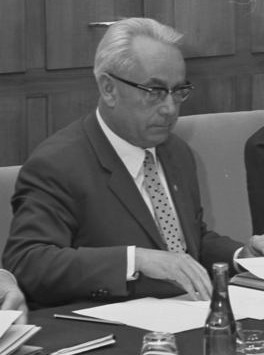Bruno Heck
( politician, spook) | |||||||||||||||||||||||
|---|---|---|---|---|---|---|---|---|---|---|---|---|---|---|---|---|---|---|---|---|---|---|---|
 | |||||||||||||||||||||||
| Born | January 20, 1917 Aalen, Germany | ||||||||||||||||||||||
| Died | September 16, 1989 (Age 72) Blaubeuren, Germany | ||||||||||||||||||||||
| Nationality | German | ||||||||||||||||||||||
| Alma mater | University of Tubingen | ||||||||||||||||||||||
| Religion | Catholic | ||||||||||||||||||||||
| Founder of | Konrad Adenauer Foundation | ||||||||||||||||||||||
| Member of | Le Cercle | ||||||||||||||||||||||
| Party | Christian Democratic Union of Germany | ||||||||||||||||||||||
Founder of the Konrad Adenauer Foundation, member of Le Cercle
| |||||||||||||||||||||||
Bruno Heck was a German politician of the Christian Democratic Union (CDU), where he was CIA liaison. He became president of the Konrad Adenauer Foundation, a front organization used for regime changes, and attended Le Cercle in 1983.
Background
Heck was born into a poor Swabian catholic family.[1] In 1938 he was called up for military service and then took part in the Second World War as a soldier of the Luftwaffe until 1945, his last rank was Oberleutnant.
He studied philosophy and theology at the University of Tübingen. From 1957 to 1976 Heck was a member of the German Bundestag.
Career
Heck had been a member of the CDU since 1946. From 1952 to 1958 he was the federal executive director of the CDU. In 1955, Heck was the Central Intelligence Agency's main contact for the establishment of a joint program between the CDU and the CIA on psychological warfare in East Germany.[2]
From 1967 to 1971, he was the first to fill the newly created post of General Secretary of the CDU. Heck's greatest success as a party manager was the 1957 federal election, when the CDU/CSU achieved an absolute majority of votes (50.2%) for the first and only time (and as the only party in German democratic parliamentary history). Heck had previously studied American election campaign methods in the USA; in addition, the CDU leaders Konrad Adenauer and Ludwig Erhard were at the peak of their reputation.
For Heck, the outcome of the 1969 federal election represented the biggest defeat. Although the CDU/CSU with Chancellor Kurt Georg Kiesinger, whose confidant was Heck, achieved the relative majority (46.1%) of the second votes and thus again became the strongest faction in the Bundestag, the SPD entered into a coalition with 42.7% and the FDP (5.8%), so that the CDU had to go from the federal government to the opposition. Kiesinger lost the Federal Chancellery to Willy Brandt and in 1971 the term of office of the party chairman Kiesinger and his General secretary Heck had also come to an end.
Heck was Minister of Family Affairs and Youth from 1962 to 1968.[3] After the resignation of the FDP ministers in 1966, he additionally headed the Ministry of Housing and Urban Development for a short time.
From 1968 to 1989, Heck headed the CDU-affiliated Konrad Adenauer Foundation (KAS) as chairman and greatly expanded its activities nationally and internationally.[4] He also had the new KAS headquarters built in Sankt Augustin near Bonn. As KAS chairman, Heck commented on the '68 movement: "The rebellion of 1968 destroyed more values than the Third Reich. Overcoming them is therefore more important than overcoming Hitler one more time."[5]
Chile 1973 coup
Shortly after the coup in Chile, Heck traveled to Chile on behalf of the CDU to find out about the situation there. Heck was already well acquainted with the situation in the country through his many years of contacts with the Chilean Christian Democrats. Back in Germany, during a press conference on October 17, 1973, he reported, among other things, on his visit to the Santiago Stadium, which housed 5000 prisoners. He described the accommodation of the prisoners as "extremely poor". In contrast to the previous weeks, the prisoners could now move outdoors, which is certainly pleasant in sunny weather. However, in the rain and cold, the life of the prisoners was "unbearable and terrible".[6] The following day, the Süddeutsche Zeitung quoted him as saying: "Life in the stadium is quite pleasant in sunny spring weather".[7] Heck was then accused of trivializing and supporting the coup and the Pinochet government. In a statement dated 4. In November 1973, Heck stated that his description of the conditions in the stadium had been turned into their opposite.[8]
Events Participated in
| Event | Start | End | Location(s) | Description |
|---|---|---|---|---|
| Le Cercle/1982 (Wildbad Kreuth) | 11 June 1982 | 13 June 1982 | Germany Hanns Seidel Foundation | 1982 conference organised by Franz Josef Bach. The participants were guests of Franz-Josef Strauss. The first page of the attendee list was published online in 2011 |
| Le Cercle/1983 (Bonn) | 30 June 1983 | 3 July 1983 | Germany Bonn | The June 1983 Cercle meeting was held in Bonn, West Germany |
References
- ↑ Ein konservativer Moralist, obituary in the German newspaper Die Zeit of September 22, 1989.
- ↑ https://www.cia.gov/readingroom/docs/GLOBKE,%20HANS_0087.pdf
- ↑ History of the Ministry of Family Affairs, Senior Citizens, Women and Youth.
- ↑ History of the Konrad Adenauer Foundation.
- ↑ https://web.archive.org/web/20080120043948/http://www.blaetter.de/artikel.php?pr=2421
- ↑ dpa Nr. 138/133 vom 17. Oktober 1973
- ↑ Süddeutsche Zeitung, 18. Oktober 1973
- ↑ Bundespresseamt – Wort zur Politik, 4. November 1973.